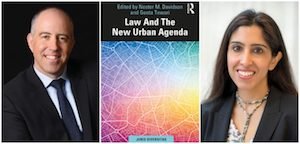Fordham Law News…
Law and the New Urban Agenda (Routledge)—the recently published third volume of the Juris Diversitas series, co-edited by Fordham Urban Law Center Faculty Director Nestor M. Davidson and Urban Law Center Director Geeta Tewari—offers an interdisciplinary legal lens into the New Urban Agenda (NUA) as a blueprint for systematic change in cities.
The NUA was formally adopted at the United Nations Conference on Housing and Sustainable Urban Development in 2016. It sets forth a new global standard for sustainable urban development while also protecting the environment.
“Our goal was to understand how specific countries or cities can actually apply the New Urban Agenda to specific issues—transportation, employment, or data privacy, for example—and examine whether or not the NUA can be effective as an instrument of law and policy,” Tewari said.
More than 15 internationally renowned urban law scholars contributed their thoughts and research in the book. One chapter, for example, focuses on the European Union’s direct response to the NUA, using examples of innovative collaborative governance in Barcelona, Spain and Turin, Italy. Another chapter looks at accessibility of public space for informal workers in New Delhi, India and Accra, Africa. And Anne Klen-Amin and Rashid Abubakar from UN-Habitat, which has previously partnered with the Urban Law Center, contributed a chapter that uses the NUA as a model towards creating a stronger definition for human rights in the context of inclusive urban planning.
UN-Habitat Executive Director Maimunah Mohd Sharif commented, “This timely volume sheds light on the many complex challenges that urban growth poses for legal systems around the globe . . . . ”
While the book was a year and a half in the making, the emergence of the global coronavirus pandemic has emphasized issues of sustainability and economic development for global cities. “Sustainable urbanism is a more critical imperative than ever and law is at the heart of the project of transforming our cities for the future,” Professor Davidson noted.
“Professor Davidson and I felt the urgency to create a book focused on the New Urban Agenda because the resolution has set a goal of sustainable cities by 2030. Given that 10 years remain before that date, we felt it would be useful to examine how teachers and scholars have begun to apply the resolution to law and policy globally,” Tewari explained. “But now, with cities on the front lines of the pandemic due to population density and the resulting strains on their healthcare systems, workforce, and economies, this book, above all, could be a tool for teachers and scholars in the field of urban law and policy to facilitate discussions with students about new ways to build safe, equitable, and sustainable cities.”
New Book Explores the Role of Law in UN Goals for Sustainable Urban Growth




